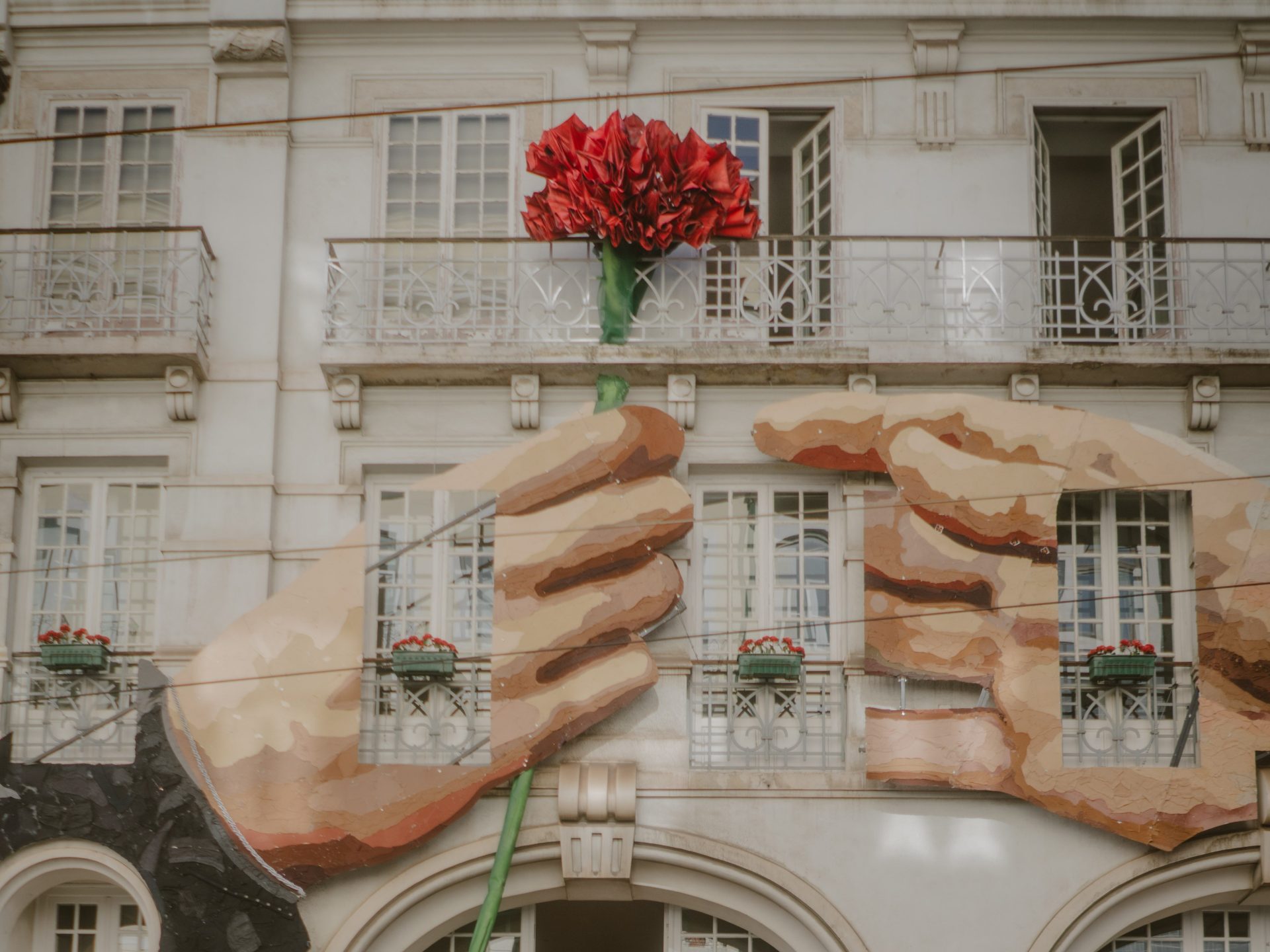
Lisbon, Portugal – The olive-green military vehicles are the same, as are the uniforms of the personnel riding them. It’s even the same day of the week on this April 25 – a Thursday.
This is when it all started, on the shore of the Tagus River where the sun hangs like a bulb over the Portuguese capital and Europe’s westernmost edge.
But the cheering crowds beside the road today, waving red carnations bought from flower ladies on Rossio Square weren’t there 50 years ago. Nobody clapped their hands or posted photos on social media along with catchy hashtags.
On that brisk dawn, the streets were deserted while Lisbon still slumbered, while a revolt was taking birth. That morning, Portugal was still a fascist dictatorship that had fought three brutal wars in Portuguese Guinea, Angola, and Mozambique in its desperate bid to keep control over its African colonies. By the end of the day, Portugal’s 42-year-old dictatorship, Estado Novo (“New State”), had been felled by a swift military takeover.
“We were professional soldiers, we’d been in wars and were trained to deal with stressful situations, but this was something completely different,” says former navy captain Carlos Almada Contreiras.
Contreiras was among the 163 military captains who in September 1973 had come together in secret at a “special farmhouse barbeque” to form the clandestine “Movement of Armed Forces” (Movimento das Forcas Armadas, MFA). These were men who had fought the Portuguese dictatorship’s colonial wars and knew very well that no military victory was close at hand; on the contrary, morale was in decline and an estimated 9,000 Portuguese soldiers had died since 1961.

On April 25, 1974, they turned their gaze towards Lisbon’s political heart, intending to seize control of key military installations, political chambers and broadcasting facilities, as well as the airport. At the time, 50 years ago, nobody could predict the outcome of the day.
However, the rebels knew that “there was no turning back,” says Contreiras.
It was now life or death – if the military action failed, the MFA conspirators would in all probability have been charged with high treason and quite possibly sentenced to death. But a victorious outcome might just bring a new dawn for a dying empire in its last throes.
Was he afraid? Contreiras takes a deep breath and recalls that morning when his life – and the lives of numerous others – changed forever. “I haven’t thought of that,” he says. “We had to act, otherwise we would continue to live in this dead political system, keep fighting these meaningless colonial wars.”
In the end, and in less than a day, MFA gained full control over Portugal’s military facilities and brought an end to the far-right dictatorship. Prime Minister Marcello Caetano bowed to the conspirators and Portugal’s notorious secret police – PIDE – was dismantled.
The following year, 1975, a US-backed counter-coup in November would supplant the new government and the Carnation Revolution would come to an end. But the change it had brought about was permanent.
“The people of Portugal and millions of people in our African colonies were given their lives back,” says Contreiras.
As Portugal celebrates 50 years of pluralistic democracy today, however, the long shadows of the country’s authoritarian past are creeping back in the wake of the March 2024 elections, in which far-right political party Chega (“Enough”) gained 18 percent of the vote and drove a wedge through the heart of the Portuguese two-party system, which had dominated the chambers of power since the 1970s.
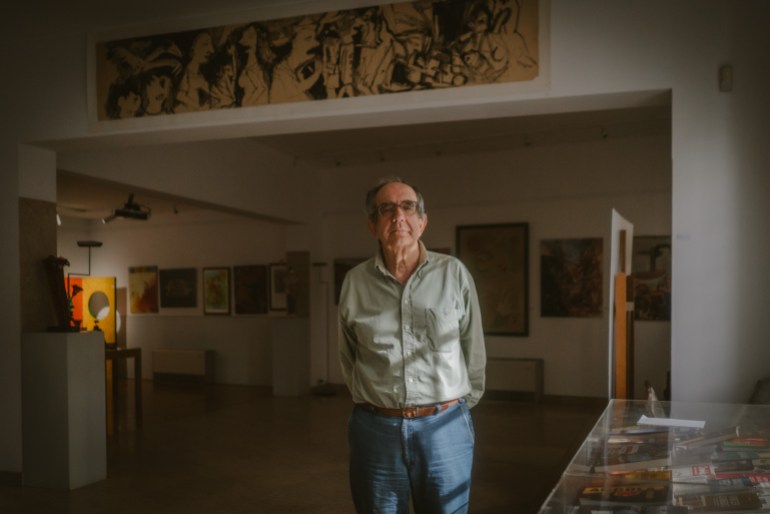
A revolution is born
On April 25, 1974, Portugal became world news. Newspapers around the world were drenched in bright images of celebrating Portuguese masses who took to the streets and placed red carnations in soldier’s rifle barrels and uniforms. Portugal’s “Carnation Revolution” is often described as a near-bloodless military takeover. But much blood had been spilled in the years leading up to that moment.
In the early 1960s, as most African nations fought for and won independence from their European colonisers, Portugal stood firm in its claim to the country’s African “possessions”. These were now dubbed “Overseas Territory” instead of “colonies” as a result of a 1951 rewrite of the constitution and the country had responded to self-determination claims with brutality and repression.
Dictator and Prime Minister Antonio de Oliveira Salazar had established the “Estado Novo” in 1932 – a corporatist state rooted in anti-liberalism and fascism formed in the wake of the demise of Portugal’s monarchy – and kept Portugal out of the second world war. Despite being a brutal dictatorship, Salazar managed to lead Portugal into NATO’s anti-communist club in 1949 thanks to its control of the Azores Islands, a vital strategic outpost.
When the first colonial war had erupted in Angola in March 1961, soon followed by wars in Portuguese Guinea and Mozambique, Portugal was able to source weaponry – helicopters, fighter aircraft and petrochemical weapons like napalm – from allied nations, primarily the United States, West Germany and France.
Furthermore, during the Cold War, the Azorean military base became a vital strategic and geopolitical outpost in the mid-Atlantic, particularly for the United States, whose continued access to the military facilities depended on political and economic support to Salazar’s authoritarian rule. The Azorean military facilities became crucial for the United States during its military operations to aid the Israel forces during the 1973 Arab-Israeli War.
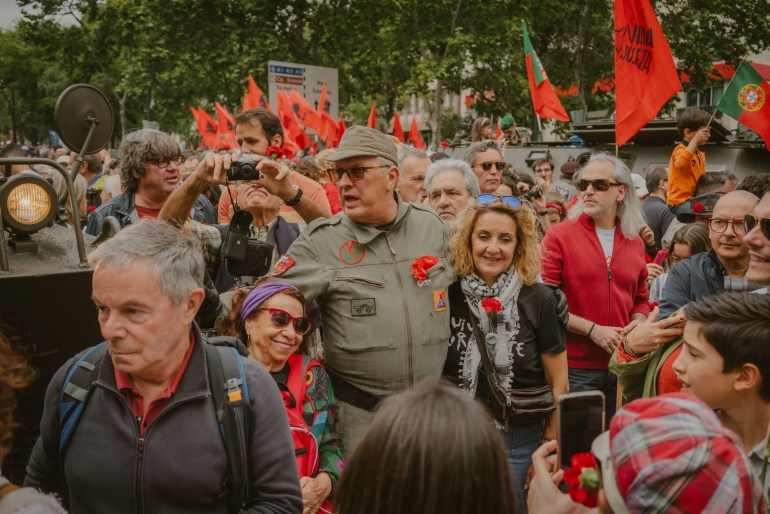
Finally, in the mid-1960s, the Portuguese dictatorship started to implode. The colonial wars had finally brought Portugal’s economy to its knees, and large numbers of forced military conscripts were deserting – much to the embarrassment of the government – fleeing the country and becoming vocal proponents of antiwar movements in countries like France, West Germany and Sweden.
As a navy captain, Contreiras patrolled the Atlantic waters between Angola and Sao Tome. He recalls the first signs of dissent within the army. Within an authoritarian political system, the very thought of rebellion was unheard of. Therefore, the first whispers of change occurred in private exchanges.
“War fatigue and a longing for democracy finally caught up with us,” he says. “As part of the navy, I experienced all war fronts, and it was a living hell.”
A revolutionary seed was planted, he believes, and it grew into something larger – something irreversible. “The revolution was born out of the words we uttered at sea.”
Along with the seemingly never-ending colonial wars, the Portuguese military had started to ease the way for more rapid military rank advancement and promotions in 1973 through a series of new laws to attract more men to pursue military careers.
Low-ranking officers who remained on the lower rungs of the career ladder despite many years of war service saw this as an existential threat. “We were both frustrated and nervous about the development,” Contreiras recalls.
In the summer of 1973, the “Naval Club” had been initiated by the 200-odd military captains who were determined to protect their military careers and refused to be singled out as scapegoats for Portugal’s declining successes in its colonial warfare. The initial programme called for “Democracy, Development and Decolonisation” and to achieve these goals, the clandestine movement realised the only way was through a military overthrow of the Estado Novo.
In September 1973, Chile’s socialist president, Salvador Allende, was overthrown by military leaders in a US-backed coup. The Naval Club decided to copy the Chilean coup makers’ use of secret signals via public radio and convinced a radio journalist, Alvaro Guerra, to join the plot. Guerra would issue the “signal” which would start the military operation by playing a chosen song on his nightly programme, Limite (“Limit”).
Contreiras secretly met Guerra “mere days before the revolution” and handed him his last instructions. The chosen song – Grandola, Vila Morena by folk singer Jose Afonso – was to be played shortly after midnight on April 25, 1974, signalling to the MFA to launch its takeover attempt. “It was well planned, it all depended on timing,” he recalls.
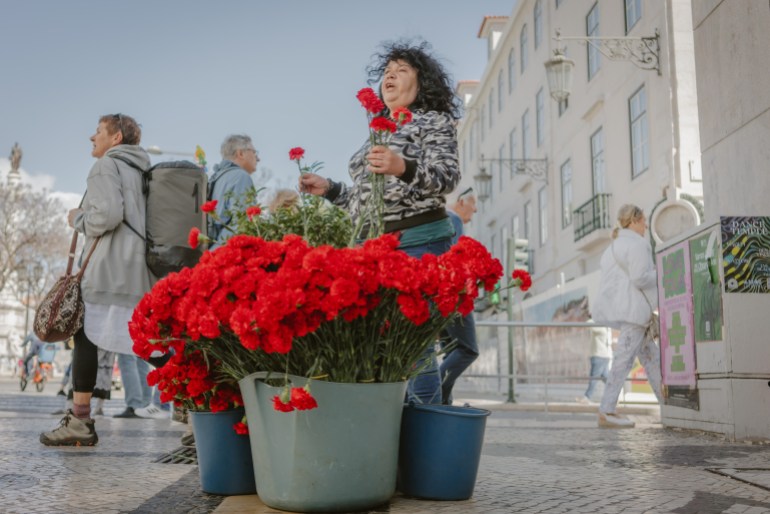
Return of the far-right?
Fifty years later, Afonso’s song is playing at a cafe on the Avenida da Liberdade as more a million people take to the street to commemorate the “Carnation Revolution”.
The impressive turnout of the elderly, youth, parents, and their toddlers underlines the importance of the dramatic political event – not just for those who lived through it.
Claudia and Lucia, two teachers in their 40s, break down and cry while drinking coffee at a cafe before the start of the commemoration march along Avenida da Liberdade down to Rossio Square.
They are crying for their parents who survived the dictatorship, explains Claudia.
“It’s so hard for them to talk about what it was like during the Estado Novo,” adds Lucia. “Many Portuguese have just put a lid over the past, never to talk about it again. For us, the children of the revolution, it’s been hard to deal with their pain, let alone helping them to move on. That’s why the rise of the far-right in Portugal is such a hard blow – for us and for our parents.”
The commemoration march – during which political leaders make speeches and cheer for the revolution while crowds of people drink beer and “ginja” (a Portuguese liqueur) – is framed by chants: “25 April, always! Fascism, never again!”
Still, in this environment of seemingly overwhelming consensus, some have chosen to march against the human current, against the wave of numerous people. A middle-aged man, seemingly just walking by, shakes his head and curses the revolution. Nobody seems to notice him, and his words are lost in the sea of revolutionary chants.
The man may be one of the self-titled pacote silencioso (“silent pack”) of whom Portuguese scholars have been talking for years, particularly during the past decade which has been a constant repetition of financial crises, government-imposed austerity policies and rising poverty, leading to an exhaustion of trust among some in democratic institutions and Portugal’s dominant parties, the Socialist Party (PS) and the Social Democratic Party (PSD).

The signs of dissent are here to be seen. On a park bench, another middle-aged man smokes a cigarette and glares at the passing wave of people. From a speaker, the hymn of the revolution is played again, to which the man screams: “Turn off that piece of shit! Nobody believes in that anyway!”
On the bench beside him lies a red carnation on top of a copy of the sports paper A Bola. A woman snaps a photo of the carnation and the newspaper, excusing herself, assuring the man she is not about to steal his flower. The man smiles and says: “Don’t worry, there are no thieves here. The only thieves are in the Portuguese parliament, stealing from the people!”
It’s a sentiment that many appear to share. Chega clinched 50 seats in parliament in the same year that Portugal celebrated 50 years of liberal democracy. According to an analysis by social scientist Riccardo Marchi, Chega’s swift rise since its formation in 2019 by Andre Ventura, a former social democrat and television personality, is rooted in Portugal’s established “two-party system”, dominated by PS and PSD and which became an established political model after the fall of Estado Novo in 1974.
Marchi writes: “The PS and PSD were unable to reverse the growing dissatisfaction of large sectors of voters with the functioning of Portuguese democracy. This feeling of democratic decline was attributed to the elite of the two dominant parties and is evidenced, for example, by the steady increase in abstention.”
Chega’s electoral victory has been at least partially attributed to the far-right party’s ability to persuade formerly reluctant voters to return to the voting booth and to present itself as an appealing choice for young adults (primarily men between 18 and 25) with a deep-lying lack of trust in political institutions. For the first time since 2009, voter turnout reached close to 60 percent, which according to Marchi is a testament to Chega’s ability to attract young voters who are “unaware of the nostalgia for the right-wing dictatorship, and dissatisfied but informed about politics, mainly through the tabloids and social networks”.
This trend has overlapped with eroded historical narratives about Portuguese colonialism and the Salazar dictatorship. There is lingering nostalgia among Chega voters for the “stability” and “order” that the Estado Novo offered its citizens, scholars have said. But the notion that the future is to be found in an authoritarian past goes hand-in-hand with a renewed global populist movement of recent years and Chega’s rewritten historical narrative, which includes downplaying the dictatorship’s global atrocities while outright celebrating it as a functioning state.
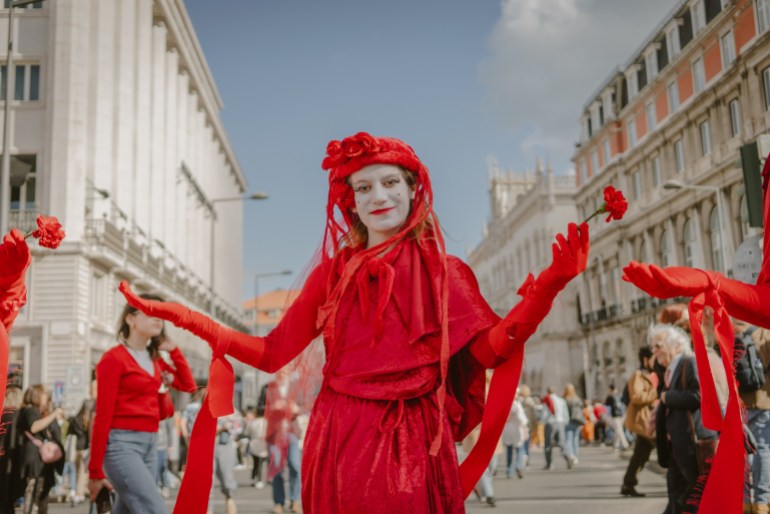
This narrative has even begun to cross the political aisle. In 2019, Lisbon’s socialist mayor, Fernando Medina, underlined Portugal’s historical global identity as “a starting point for routes to discover new worlds, new people, new ideas”. Portraying Portugal as a positive historical actor who “discovered new shores”, Medina turned a blind eye to the brutality and atrocities that went hand in hand with Portuguese colonialism.
In the conservative press, Chega’s rise is portrayed as “a maturing wine” while the Carnation Revolution, according to The European Conservative magazine, opened the door to political instability, chaos and “left-wing hegemony”.
Framing its movement as a resurrection of Portuguese dignity and identity has been a success for the Portuguese far-right, according to an analysis by anthropologist Elsa Peralta: “In today’s overall scenario of global crisis, former imperial myths and mentalities seem to have gained a second life, often testifying to a grip on a nostalgic and biased version of the colonial past,” she writes.
Chega has been able to ride this nostalgic wave, lifted by a European discourse rooted in xenophobia, focusing on immigration and populist solutions to complex financial and political dilemmas, observers have said.
Uprooting the seeds of a revolution
Half a century ago, Estado Novo’s primary pillars of power were the police, military and the Catholic church – and academic circles. Both of Estado Novo’s dictators, Salazar and Caetano, were well-educated economists who saw Portugal’s universities as an extension of the conservative identity of the corporatist state.
Today, many Portuguese universities have become ideological battlegrounds between Chega’s far-right policy and climate action groups who are taking a stand against fossil fuels-driven capitalism.
The day before the 50th anniversary of the Carnation Revolution, Matilde Ventura and Jissica Silva from the student climate crisis action group Greve Climatica Estudantil (GCE), are smoking cigarettes in plastic chairs and enjoying the sunshine next to protest tents pitched on the campus of Lisbon’s Faculty of Social and Human Sciences for the past month.
This is a group action with various other action groups at universities in Portugal and other European countries, protesting against the country’s dependency on fossil fuels.
According to Ventura, a political science student, the climate crisis has become a perfect engine for Chega and the party’s far-right agenda which downplays the man-made environmental destruction of the Earth and questions climate change as a hoax.
“Something’s changing here,” she says, squinting her eyes against the bright sunshine.
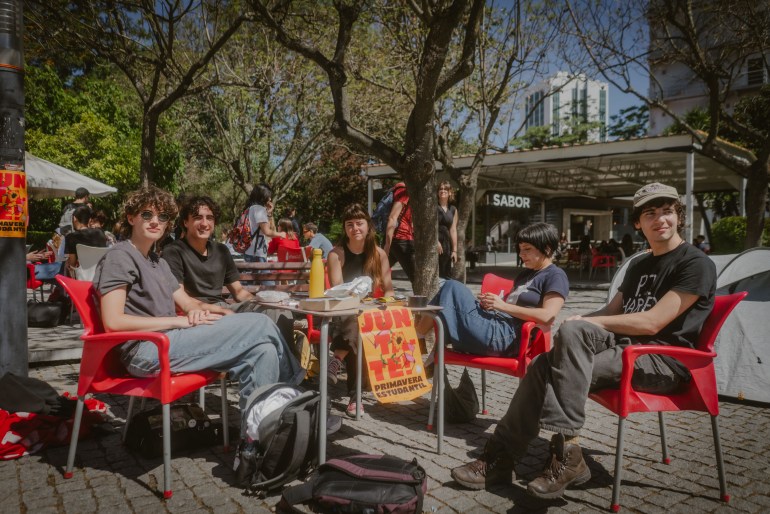
She recalls the early hours of Monday, November 13, 2023, when the climate action groups had decided to occupy the campus ground. That was when police stormed the campus and forced the student occupants out of their tents where they slept. They were hauled to the police station and kept in custody overnight. “It was the first time since the Salazar dictatorship that police crossed the threshold into a university,” she says. “It was a significant and symbolic step. The police were violent against us, and – don’t forget – there are many Chega supporters among the police. But we refused to be silent.”
The students returned to the faculty campus the next day, refused to leave, and continued to make their voices heard. The threat against democracy and the climate go hand in hand, says Silva, a medical student. “The fossil fuels-driven capitalism is the context that embodies all aspects of the problem,” she adds. “All issues – political, financial, social and environmental – can be traced to the problem with climate change and its roots in fossil fuels dependency.”
CGE’s campus occupation is significant for both Portugal’s far-right movements and the country’s financial oligarchy. Lisbon’s Faculty of Social and Human Sciences was born from the Carnation Revolution, established in 1977 on a site that had previously belonged to the military.
Now, the faculty is about to be removed and the former military barracks it occupies is to be converted into a hotel complex. The moving date is not set, but the occupying students of CGE see it as a symbol of political ebb – of uprooting one of many seeds planted by the revolution.
“The circle is closed,” says Ventura. “It’s been 50 years since the revolution, and the far-right is back. Not only in parliament but also as a force against the democratic fight against the climate crisis.”
Members of Chega were there, at the campus, when Ventura and Silva and other students returned from police custody, they say. Chega’s young political star, 25-year-old former university student Rita Matias, entered the campus to hand out flyers and denounce the climate crisis protests.
“Chega was protected by the police,” says Ventura. “But we managed to oust them from the campus and block the entrance by forming a human wall and chanted the same motto as our parents did after the revolution: ‘25 of April, always! Fascism, never again!’”
The incident, she concludes, was a testament to the perils of Portugal’s far-right momentum: “Portugal’s political and economic leaders have no idea how it is to live here. If they did, they wouldn’t waste another minute by moving forward in the same shape and form as today.”
Silva talks of her grandfather, a war veteran from the battlefield of Portuguese Guinea (now Guinea-Bissau and Cape Verde). “He often talks about our shared responsibility to make things right,” she says. “He returned to Africa after the revolution to work with a museum, to remember the colonial wars and what really happened. That’s an inspiration for me.”

A lost revolution?
All over Lisbon, there are red carnations painted on murals, displayed on posters, visible in shops and worn by people. On an electricity pole close by, someone has shared a question on a poster for the 50th anniversary: “E depois?”(“And then what?”)
Portugal’s Carnation Revolution was “the most profound to have taken place in Europe since the Second World War”, writes historian Raquel Varela in her book about the revolution, A People’s History. But it’s easier to commemorate the dismantling of a fascist dictatorship and the decolonisation of African colonies than to approach the death of the revolution, due to the following counter-coup on November 25, 1975. As one prominent employee at Lisbon University, who wishes to remain anonymous, puts it, “We must not only remember 25 April 1974 but also address the trauma of 25 November 1975.”
Varela concludes that the reason the Portuguese coup in 1975 remains a delicate political topic is that it suffocated a social revolution that “was the last European revolution to call into question private property of the means of production”.
Between April 1974 and November 1975, writes Varela, “hundreds of thousands of workers went on strike, hundreds of workplaces were occupied sometimes for months and perhaps almost 3 million people took part in demonstrations, occupations and commissions. A great many workplaces were taken over and run by the workers. Land in much of southern and central Portugal was taken over by the workers themselves. Women won, almost overnight, a host of concessions and made massive strides towards equal pay and equality.”
Portugal’s NATO allies, primarily the United States, feared that the former fascist state would become a socialist state. The White House, led by President Gerald Ford and Secretary of State Henry Kissinger, acted through the US embassy in Lisbon, instructing the American ambassador Frank Carlucci – later secretary of defense – to “vaccinate” Portugal against the communist disease. The United States supported an anti-communist military section, the so-called “Group of Nine” with both political capital and military equipment, as well as bullying Portugal within the NATO community.
When the “Group of Nine” finally deposed the revolutionary government in Lisbon on November 25, 1975, by dispatching 1,000 paratroopers, and clinched power over the Portuguese government, the Carnation Revolution came to an end.
The historical aftermath has been dominated by a narrative based on the notion that the Group of Nine normalised and stabilised Portuguese society via a “democratic counter-revolution”. The United States rewarded Portugal with a massive economic boost in the form of a “jumbo loan” to integrate the Portuguese Armed Forces further into NATO and liberalise the industries that had been “socialised” during the revolution.
Now, the tiny right-wing party, Centro Democratico e Social – Partido Popular (CDS-PP), has moved to make November 25, 1975 an annual day of remembrance. The day, CDS-PP states in a submitted law proposal, “marked the path towards an irreversibly liberal democracy of the Western model”. This proposal has the backing of Chega while PS, the Communist Party and the Left Bloc oppose it.
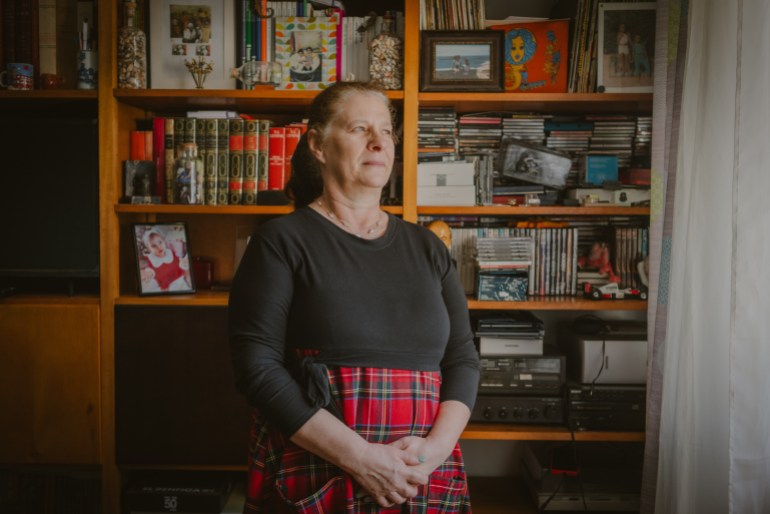
‘I am a refugee, not a returnee’
One focus of attention for far-right parties in Portugal today is immigration. One-third of Portugal’s non-white immigrants live in poverty.
In Rio de Mouro, a town of 50,000 inhabitants situated 23 kilometres (14 miles) from Lisbon, migrant workers from former Portuguese colonies arrive to sub-let over-priced apartments and take low-paid jobs in construction, the service sector or season-dependent industries.
Silvandira Costa, a 61-year-old assistant administrator and union activist at Editorial do Ministerio da Educação, a publisher of learning materials, points to a row of apartment buildings a five-minute drive from the train station. “All these houses were occupied by returnees after the revolution,” she says. “People had no place to go, nowhere to sleep, so they became squatters.”
Costa can relate to their situation. She was in her early teens in 1977 when her family “returned” to Portugal from Guinea-Bissau, where she was born, in the wake of Guinean independence. “I’m a refugee,” Costa emphasises – she does not see herself as a “returnee”. “I consider myself African. I was born in Guinea, I had my first experiences of smell and taste of food and experiencing the soil and the solidarity among the people in the village where I grew up.”
Refugee status, however, was never granted to 500,000 – 800,000 Portuguese citizens who arrived in Portugal in the mid-1970s from the former colonies. Portugal’s post-revolution governments and the United Nations High Commissioner’s Office for Refugees (UNHCR) deemed them “citizens of the country of their destination” and, therefore, not eligible for refugee status under the Convention of Refugees of 1951. For Silva, that underlined the sentiment of being a castaway in a new society, one to which she arrived without any possessions but the clothes she was wearing. “If we weren’t refugees, then what were we?” she asks out loud. “We left our home in Guinea in a hurry, boarded a plane and expected to deal with the situation in Portugal without any money, nowhere to stay, no work for our mom and me and my sister were looked upon as aliens at school.”
Costa’s mother had left Portugal in the 1950s, as part of an immigration programme under which Portuguese citizens – often poor families and urban dwellers – were promised land and a purpose at the frontiers of the empire. The colonial war in Portuguese Guinea changed everything. Then the Carnation Revolution ended 500 years of Portuguese presence in Africa.
It was a burden to carry, to be the “physical representation of Portuguese colonialism and repression”, says Costa.

At the train station, she approaches a group of young Guinean men who have gathered on the concrete steps close to the train station. They speak in Creole, about life, hardships, the situation in Guinea-Bissau, and the future.
“The future?” says one man and laughs. “We talk about Africa – but the only future we’ve got is the world under our feet.”
“Portugal has an enormous responsibility to deal with her colonial past and atrocities against African people,” says Costa. “Chega repeats the same historical mistake as the fascists did by blaming poverty, inflated living costs and social insecurity on immigrants. They’re afraid of the truth, and now they’re trying to whitewash Portugal’s colonial history.”
A closed circle
Back in Lisbon, at Rua da Misericordia, on the second floor of the old military barracks that was overtaken by the MFA on April 25, 1974, former navy captain Carlos Almada Contreiras looks out over the same street on which his life irrevocably changed – along with the lives of millions of others in Portugal and its colonies.
Now, tourists stroll in and out of restaurants and stores. Vehicles drive up and down the same cobblestone street that carried the olive-green military vehicles that early April morning 50 years ago.
“So much has changed, yet the street remains the same,” he almost whispers.
Locked inside the narrow street, constantly sprayed by salty winds from the Atlantic Ocean, Europe’s last social revolution took place. “It was a revolution for the coming generations; it’s important to tell the story in a way that runs along their everyday life, to make them realise what was at stake back in 1974.”
How did it feel to be part of the collapse of a colonial empire? Contreiras laughs, ponders the question, and then answers: “I’ve never really thought of it. But sure, that’s what we accomplished in the end.”










